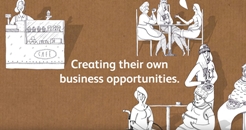 Self-Reliant Groups
Self-Reliant Groups
From an article by Nesta and WEvolution
Self-reliant groups (SRGs) are small groups of people (4 to 10) who come from a shared economic and/or social background to support each other and develop friendships. They meet regularly and agree to start saving, rotating leadership and responsibility, learning together and sharing skills. Many of them start a small business which, in time, will help them earn an income to support themselves and their families.
The regular meeting of the group develops a sense of purpose and ownership among members from the onset. Members can rely on each other and are encouraged to offer peer support and development opportunities, further enhancing a shared responsibility and accountability within the group. Through the SRG way of working, group members believe that helping themselves, each other and together creating opportunities for change and enterprise in their local communities is the best way forward.
The SRG model is well tested - having foundations in the Self Help Group (SHG) movement in India which was founded in the 1970’s, and is now a national movement where it is transforming rural and urban communities with thousands of active groups.
The SRG movement in the UK was sparked by a Church of Scotland initiative called Passage from India (now WEvolution) in 2011 when 13 women from across the UK visited established SHGs in India. The SHG model was then adapted to the UK, becoming SRGs. Over the last 5 years there has been some exciting growth of the SRG model throughout Scotland, and with partners in England, Wales and elsewhere. There are now 90 emerging and operational SRGs UK wide. The success of this growing movement has led to an interest in the way SRGs can be supported to address a range of social and economic issues.
Among the established SRGs there are some inspiring examples of people improving the economic circumstances of themselves and their communities such as: Trishy Gannon who has started No. 26 – a high end crafts and arts store on a high street in Gourock, Scotland and Karen Stevens who has starter her own Miss Fix It handywoman business. One of the SRGs in Wales recently worked in partnership with Cardiff Metropolitan University to produce 40 ground breaking products designed for people living with dementia. The products were sent for extended trials prior to full manufacturing and the SRG members worked with the design team from the university and used their recently learnt sewing skills. This could be the start of small scale, locally based manufacturing through the Welsh groups - a completely innovative approach with SRGs at the forefront.
On the potential benefits of the SRGs, Niall Cooper, Director at Church Action on Poverty has said:
“I would emphasise at least as strongly the fact that SRGs improve people's social circumstances as well as economic ones. In sustainable livelihood terms, SRGs boost peoples own personal assets of self-confidence, capacity and agency, and significantly increase social assets/capital through the common bond of the SRG and the sense of being part of a wider movement. In anti-poverty terms, this can be hugely empowering and transformative.”
An SRG can be a good way to support people you are in contact with to come together to create opportunities for themselves. If you want to start one, watch this 2 minute video:
See also blog on Purple Shoots who have SRGs and then help with finance.
Retweet about this article:
From an article by Nesta and WEvolution, 26/06/2019